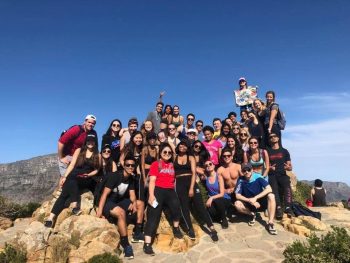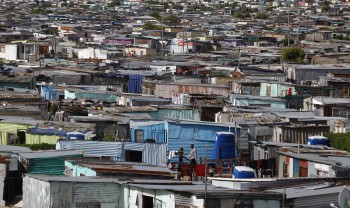By Ally Barth
Twenty hours of travel later, we stepped off the plane to a harmonious chorus of “Happy Birthday!” Of course, it was nobody’s birthday, but our South African companions were passionate about properly welcoming us to their country, American-style. After one intensive week hard at work, we finally arrived. We’d spent the previous week in Boston reading about the tragic history of apartheid, learning about Desmond Tutu’s Truth and Reconciliation Commission, and discussing pressing social issues the people of South Africa still face today. However, none of us were truly prepared for what the next three weeks had in store.
The South Africa Social Entrepreneurship and Consulting Dialogue is a trip that I recommend to anyone interested in social entrepreneurship – or really anyone at all. We spent our first two weeks in Cape Town partnering with students at a local business school, TSiBA. In small groups of students from both schools, we each worked on a consulting project to help a local entrepreneur develop their business. Together we devised a consulting report and presentation for each of our entrepreneurs, and created meaningful relationships along the way. During the last week of the program, we participated in service projects ranging from visiting children at crèches, to farming and composting in community gardens, to conducting eye exams and providing free glasses to local community members. We also strengthened our understanding of human-centered design through lessons taught by Professor Gordon Adomdza, an expert in the field of design-thinking.

Students from Northeastern’s 2018 South Africa Dialogue at the top of Lion’s Head hike.
During our time in South Africa, we bonded with the TSiBA students through classes, projects, tours, hikes (note: Table Mountain is not an “easy” hike, no matter what the TAs say), excursions, and outings outside of the program. We shared many laughs, meals, songs, and dances with one another. While of course none of us would claim to be an expert on South African culture, many of us are better equipped to understand the inequalities and lingering effects of apartheid that still haunt the society today. We toured informal settlements juxtaposed with some of the wealthiest properties in the world. Some of us witnessed abject poverty for the first time, and our eyes were opened to the tragic state of reality our South African peers endure each day.
After three weeks of immersing ourselves in South African communities, we learned that service is about incremental change–playing with kids at a school for a day won’t change their lives, but these types of interactions do provide hope, the opportunity to exchange conversations with others from different backgrounds, and the chance to learn from one another. Service is not about belittlement, but rather it is about this engagement and formation of bonds–change does not come about by ignorantly impeding your “help” and your beliefs on people. It is brought about by creating connections and better understanding history, culture, strengths, pressures, and issues in a community. Throughout this dialogue we were all able to take a step back and try our best to understand the people and the eye opening culture in townships like Gugulethu, Langa, Khayelitsha, and Imizamo Yethu. We were able to develop significant connections that went beyond a white savior mentality (of doing things to help oneself, rather than others).

Snapshot of Cape Town’s Khayelitsha township.
This trip created lasting impact by exposing each of us first-hand to abject poverty, and transforming the abstract into reality. Each consulting group was able to develop their entrepreneur’s business beyond what they may have been capable of doing alone. My own group listened carefully as our entrepreneur told us about losing her child earlier that year. We were able to be there for her, provide support, and usher her into the next chapter of her life. Impacts like these cannot be made through money alone, but through experiences.
While flaws in traditional “service trips” do exist, this program through Northeastern’s Social Enterprise Institute was carefully designed to avoid those common unintended consequences like white savior syndrome. Instead, our trip focused on meaningful connections, shared values, and a common goal of learning and making small-scale impacts through hands-on experiences. The goal is for each of us to use our experiences from this program as a catalyst for creating larger impact later in our lives. If done for the right reasons, conducting service is a great way of eliminating ignorance and expanding our worldview.


